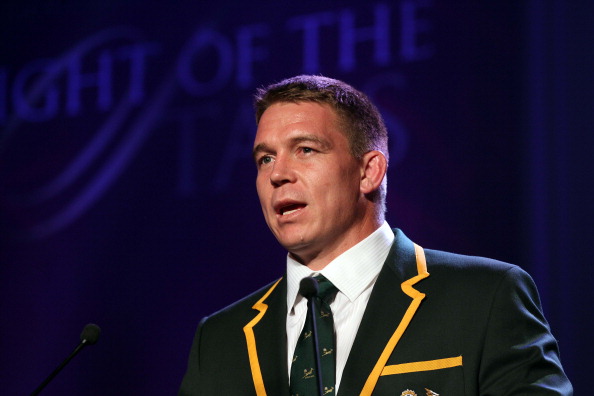A game does not end when the final whistle blows. Its impact reverberates throughout a community when the stadiums are empty. Former rugby captain John Smit, in his role as CEO of a security company, has ensured that the tournaments are alive and kicking.
As captain of the World Cup-winning Springboks in 2007, John Smit was, “Mr Right Place, Right Time”. He was the centerpiece that connected management to the players and the players to the fans.
His talents have evolved into the commercial sphere, where he now sits and curates a partnership that could save rugby and have a much more meaningful impact on the communities whose lives revolve around club rugby.
Security and maintenance company SSG Group – for which Smit is acting CEO – were, in March, named co-sponsors for the Gold Cup, a rugby tournament steeped in the blood and sweat of community involvement.
“A lot of our clientele are the mines in the North West and Limpopo area,” Smit says.
Loading...
READ MORE | Bryan Habana Swaps Sweatpants For Suits
“Those communities are massively passionate about the game and we wanted to show that this company not only wanted to leave a footprint within the community using SMEs but also, we wanted to help keep a tournament alive that is quite important to a lot of them.
“It was really just to show our gratitude for the community that we were allowed to work within. I met the Rustenburg Impala Rugby Club guys a few weeks ago and rugby is really important around that mining area.
“It’s a massive part of their culture and their working environment. When this thing happened, Jorge Ferreira (SSG Group CEO) called me to get my thoughts on what this sponsorship would entail. I said to him it’s an unbelievable partnership because everyone wants to go straight to the top but this is where the real rugby starts and ends.”
Fans pack the creaky stands, making a ruckus and cheering uninhibitedly for their sons, fathers and uncles as they put their bodies through the dirt for the sheer pleasure of it.
In most communities where club rugby is played, it’s the only recreational outlet with the gravitas that pulls 12,000 people to a game, like last year’s Pirates Grand Challenge Final between Villagers Worcester and Roses United in Worcester last year.
Put into perspective, 14,000 people watched the Stormers play the Lions at Newlands in February. Goliath-eque franchise budgets were brought to size by passionate, ordinary folk.
“There was a guy that came to one of the games on horseback. There were so many people at the game that he could not see, so he watched the game on his horse to get a view,” Smit says.
You can only get that at Gold Cup games. It’s something magically unique. These people play for free, they play for the community and they play for each other.
“The games are well-supported because the communities have a vested interest in the game – their husbands, uncles, brothers, friends, cousins, employees or employers are participating in them. Everyone comes.”
The Gold Cup portfolio landed on Smit’s desk by chance. One might say there was some alchemy involved. Ferriera’s untimely death, last year, meant Smit was redeployed from shareholding company Richmark Holdings to hold the SSG fort.
When he got to Ferreira’s seat, he saw the founder’s plans for the partnership with SA Rugby were complete. The baby was in the right hands. Smit wasted precious little time and stamped the deal.
In a time of austerity, load-shedding and budget cuts, Smit saw the forest for the trees.
“I can’t take credit for that because it was the brainchild of our previous CEO,” he says.
“I am delighted that I am a part of this and that things have worked out in such a way that made it possible. This was pioneered by Jorge Ferreira and supported by two other companies (Blu Approved and M4Jam) who made it possible.
“The unique positioning, the timing of my transition into SSG, I don’t think there would have been anyone else who understood what the Gold Cup means to this country and the communities that hold it dear.
READ MORE | Super Rugby In Sin Bin
“It’s hard to quantify that commercially because it is more of an emotive vibe. These communities have passionate people who stick with the game after school. They are the backbone because they are not playing for money.”
Indeed, if it isn’t a man atop his steed looking for a glimpse of the action, it’s a “tannie” (older woman) selling boerewors rolls on the grass bank. It’s kids running freely along the touchline, collecting balls that have been kicked too long and returning them to their hometown heroes.
It’s a second and third chance at the game for players who’ve been hooved by professional rugby’s cut-throat contracting system – such as MB Lusaseni, College Rovers captain and former Lions lock. It’s a combination of all these factors that make a mineworker spend his or her free time in the hot sun, absorbing the Gold Cup.
-Sibusiso Mjikeliso
Loading...
